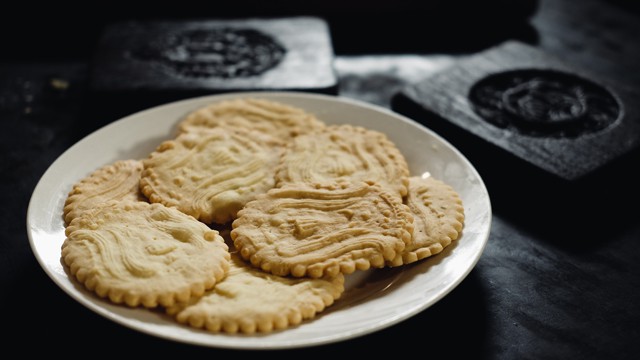
Nothing is more synonymous with Atching Lillian than the traditional and highly-storied San Nicolas cookies. Like many of our traditional desserts, San Nicolas cookies were born from a surplus of egg yolks in the 1600s when churches were being built and one of the important components of those mighty structures were egg whites. They used to dump the egg yolks in one area which eventually emanated a stink, prompting the nuns to teach the local women to bake with them instead.
They taught them how to make Panecillo de San Nicolas (in English, this directly translates to “little bread of Saint Nicolas”), shortbread cookies reminiscent of the more recognizable uraro, but not quite as powdery and more melt-in-your-mouth. Soon, the Kapamapangans were making San Nicolas cookies that were more ornate and delicious than those of the Spanish nuns. Atching Lillian still uses centuries-old wooden molds for her cookies where she lays the dough over it and, with the use of a rolling pin, gets the dough into every crack and crevice to produce intricate details. The designs of these cookies vary depending on the town where it was made: either an image of St. Nicolas of Tolentino or other designs that are emblematic of its origin.
As Italian nonnas would say about making gnocchi, the quality of your San Nicolas cookie dough depends mostly on muscle memory and instinct. Atching Lillian claims she is generous with sharing her heirloom recipe because, in the end, it is how the dough feels on her fingers that tells her she is doing it right. You will see so many recipes and bakers selling San Nicolas cookies online and perhaps most are based on Atching Lillian’s heirloom recipe. However, one bite of her cookies will tell you that the difference lies in the expert kneading of that dough using fingers that, as legend has it, were lightly slapped for every wrong estimation.
The early Kapampangans believed that the cookies had healing powers, perhaps because they timed their baking by praying a certain number of Our Fathers, Hail Mary’s, Glory Be, and maybe an Ave Maria for good measure. Others even brought them to church to be blessed by a priest. Still, Atching Lillian does not believe these cookies are a magical cure-all for illnesses, but perhaps the prayers do make them special. Whatever your faith tells you, Atching Lillian’s cookies are truly a cut above the rest not only because of its amazing quality but also because it was made by the hands of this exemplary woman.

Recent Comments